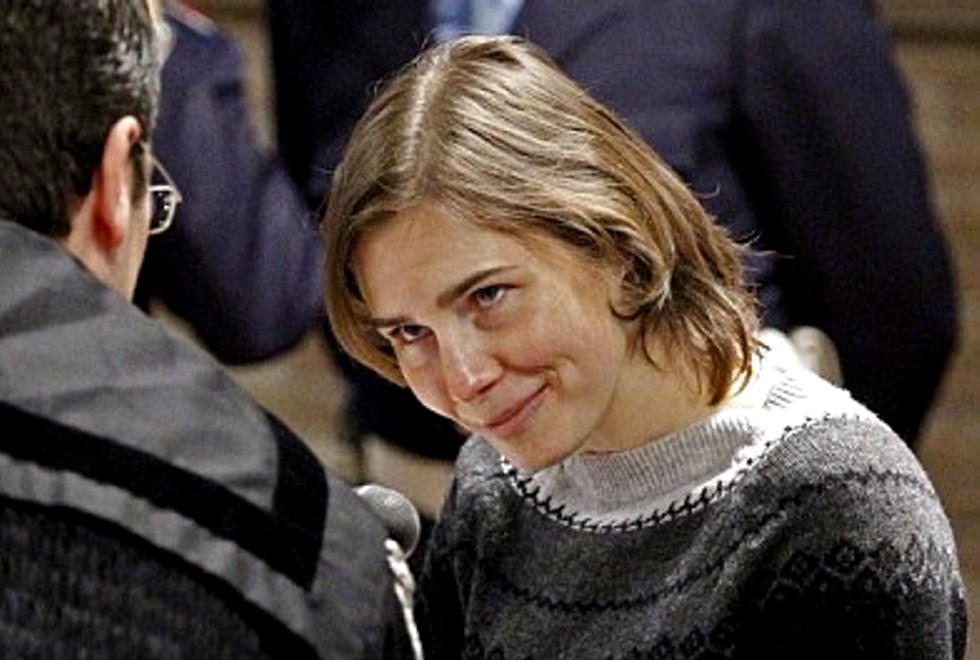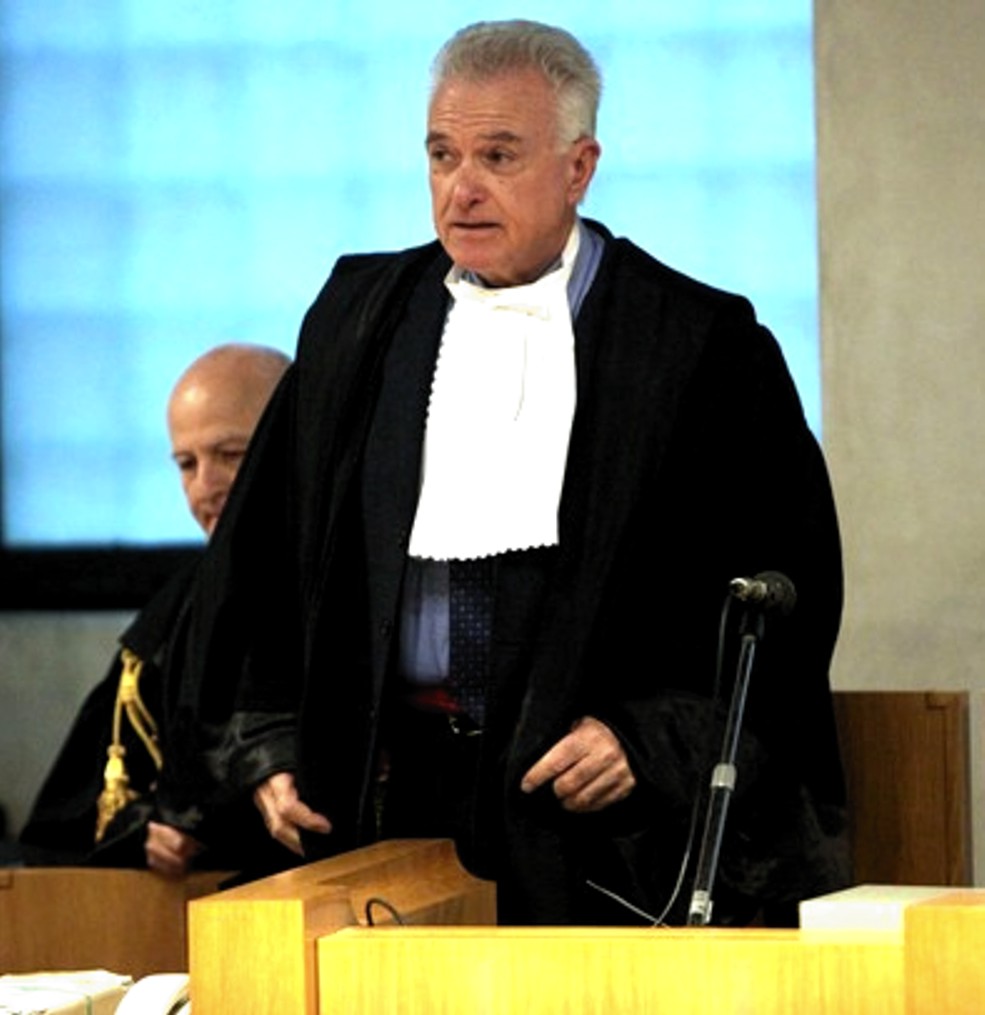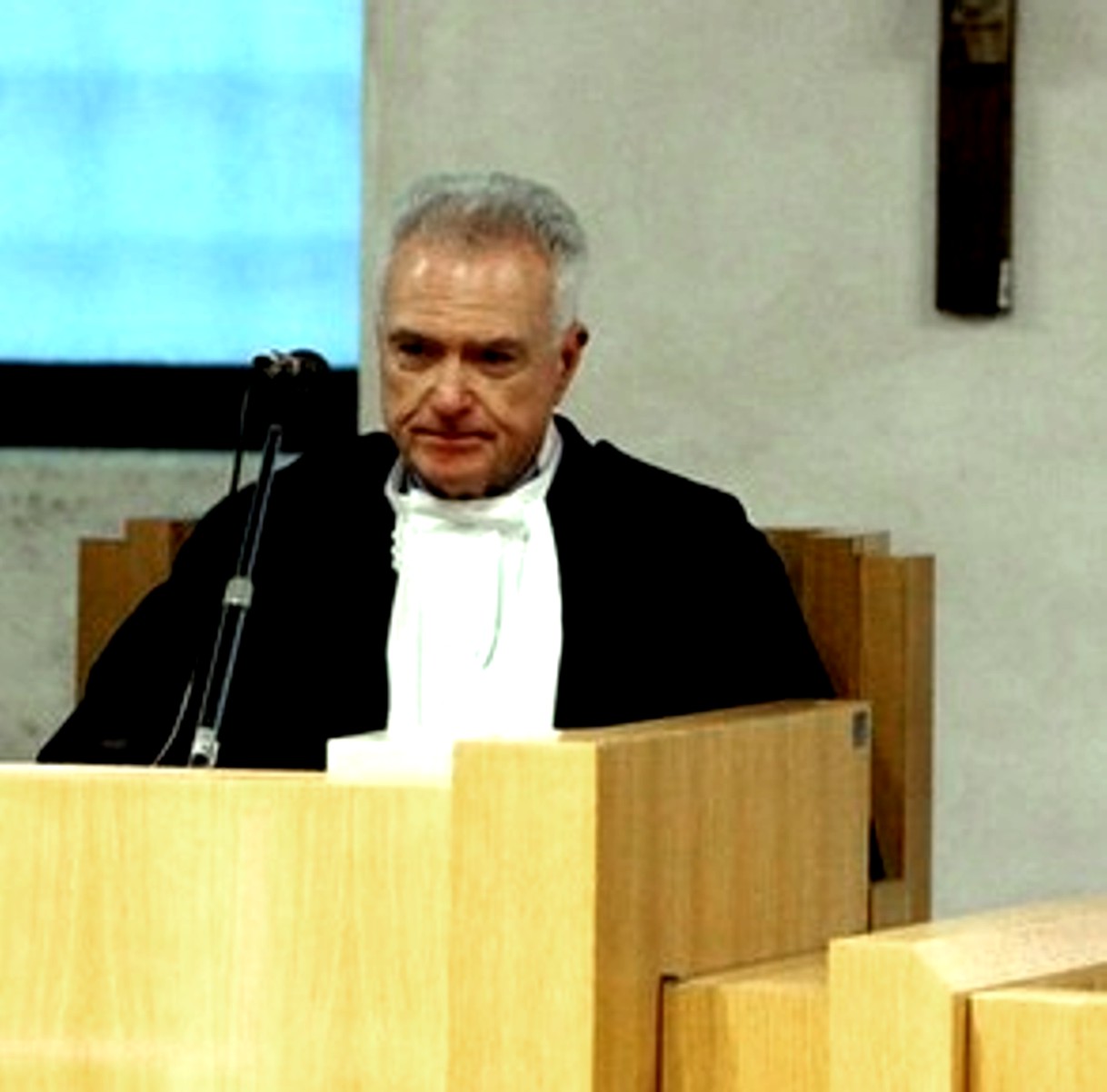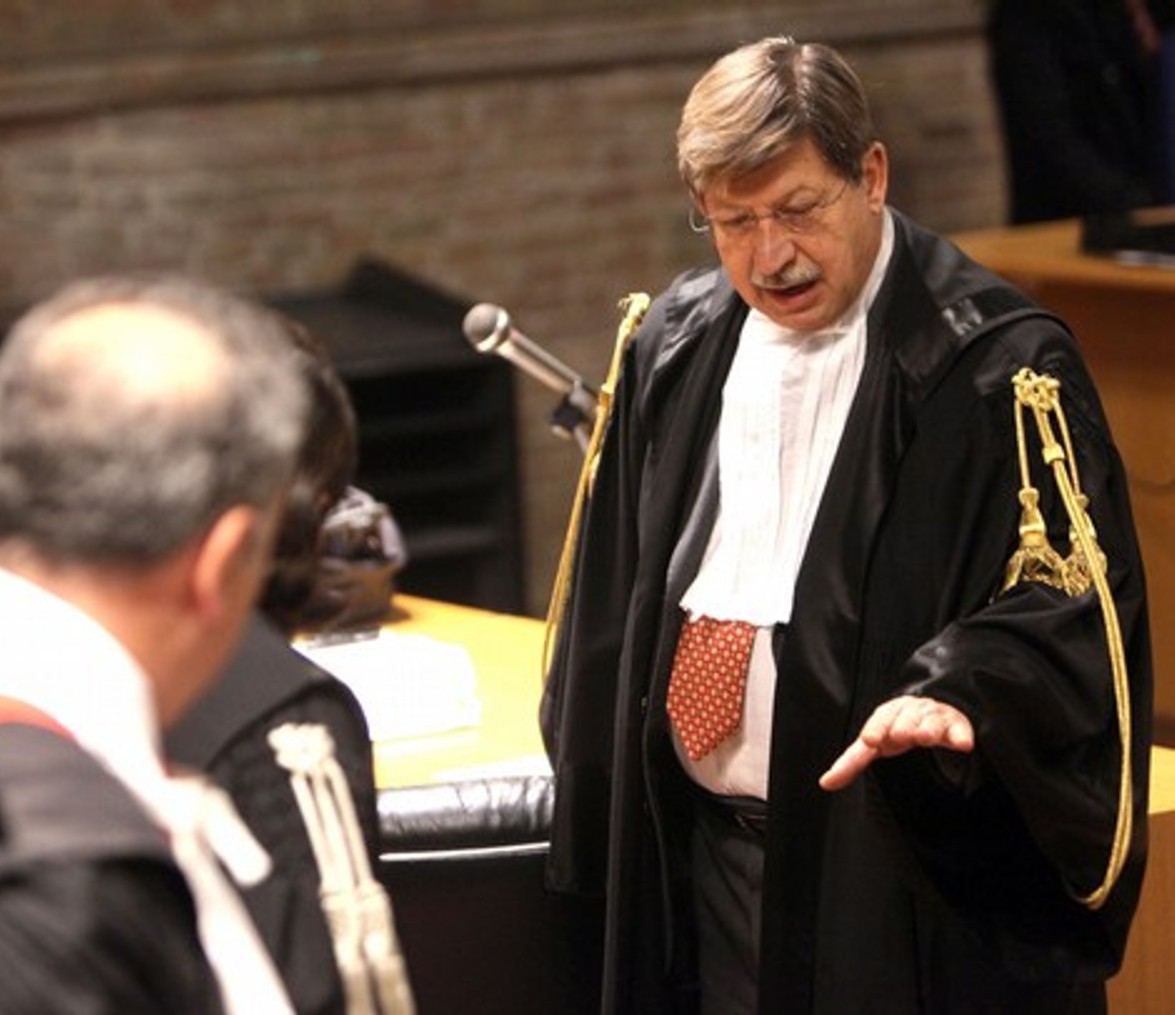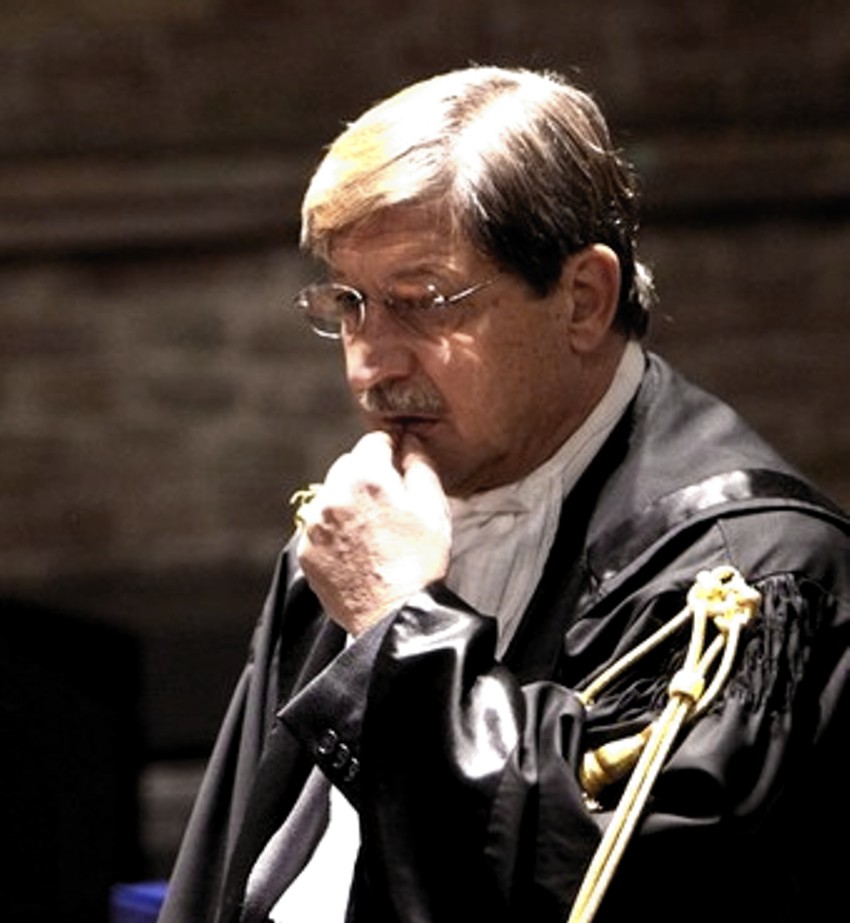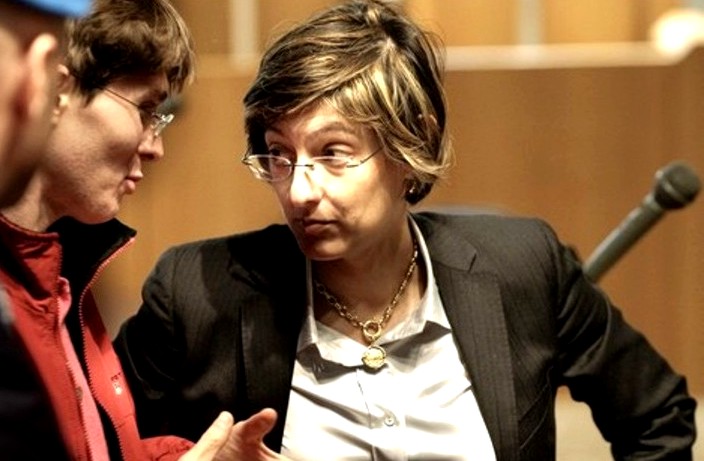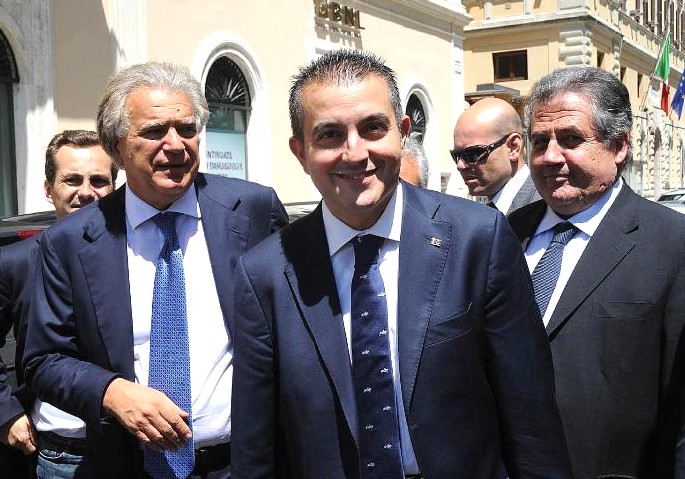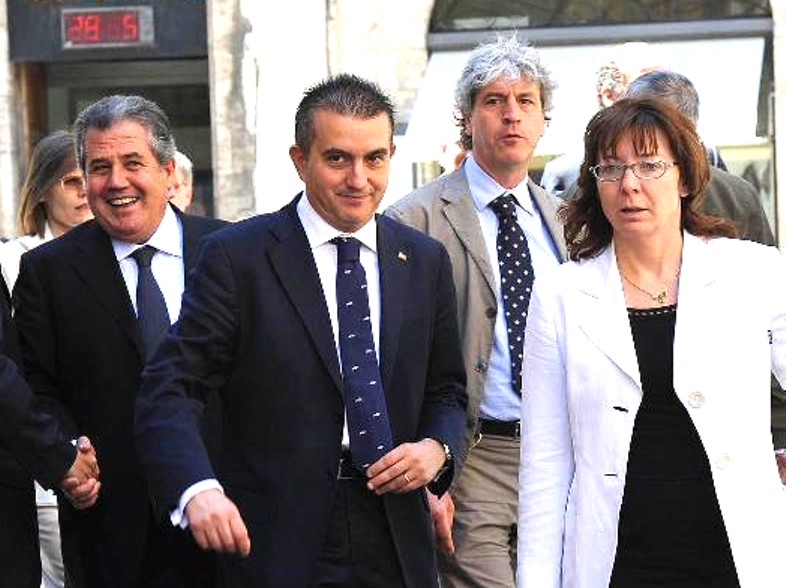
Category: The officially involved
Saturday, December 18, 2010
The Appeal’s Set Limits: What The Judges Allowed Today And Didn’t Might Tell Us A Lot
Posted by TomM
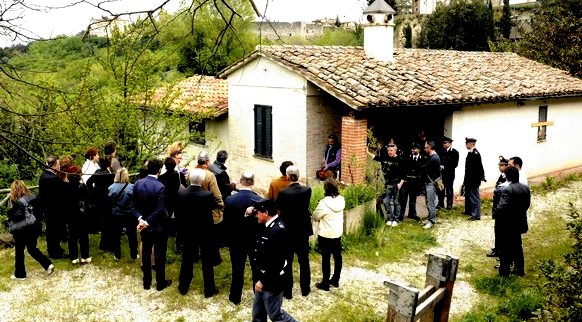
[Massei court deciding whether to buy spiderman theory; they didn’t]
1. The Context Of These Remarks
The judge ruled on the appeal’s inclusions and exclusions today. I’ll summarise what they are and how American courts might have differed.
I really do not understand why the defense and the family are so happy with this review, which is very limited and not complete in any sense - other than, perhaps, the “any port in a storm” phenomenon.
From my view in the bleachers, there are way more risks to the defense than to the prosecution from Saturday’s rulings.
2. What’s Allowed In Italian Appeals V. American
As a California lawyer familiar with trials and appeals in my state, watching the Meredith Kercher murder trial wind its way through the Italian legal system has been a learning experience.
It is a system with more protections than the one I know first-hand. The case is now in its first appeal phase, and proceeds far differently from the way it would in the US.
- If Knox and Sollecito had been convicted in an American court (which an American court would have had no difficulty in doing) less helpful presumptions would be applied to their appeal.
- In Italy they are convicted, and for that reason they are imprisoned and the visitation privileges they had before the jury’s verdict have been reduced. But for purposes of weighing the evidence in the appeal, they are presumed innocent.
- In the US, the court of appeal would not presume them innocent or guilty; it would regard them as having been adjudged guilty.
- In Italy, they can ask for the court of appeal to hear testimony from new witnesses and seek to introduce additional evidence.
- In the US, the appeal would be on the basis of the clerk’s and reporter’s transcripts of the trial. In the US the jury at the original trial would have been instructed that if an item of evidence can be interpreted two ways, one favoring guilt and one favoring innocence, they should accept the interpretation that favors innocence. But not so on appeal; the court of appeal would interpret all the inferences from the evidence in the light most favorable to the prosecution.
- An American court of appeal would not consider an attack on the credibility of a witness unless the testimony was such that no reasonable person would believe the testimony.Thus, an attack on the testimony of Curatolo would have no chance of success on appeal. In fact, jury instruction in the US would give the jury blessing to believe him even absent disco buses running that fatal night.
From a form jury instruction on how to judge witness credibility:
“Do not automatically reject testimony just because of inconsistencies or conflicts. Consider whether the differences are important or not. People sometimes honestly forget things or make mistakes about what they remember. Also, two people may witness the same event yet see or hear it differently.”
The Italian appeal is described as a “trial de novo”.
- In common law jurisprudence, a trial de novo is simply a new trial, and the jury in a new trial would not even be told of the existence of the first trial. It would be done as if the first trial never happened.
- Not so in Italy. The jury and lay judges have full access to the case dossier, the Massei Motivazione, and the briefs of the parties. They decide which parts of the case should receive new evidence, and the parts where none is needed. If that were not the case, they would not know how to respond to the defense requests.
3. Tellingly, What Court Has NOT Re-opened
1. Staging Of Burglary
It is significant that there is no re-visit on the staging of the burglary. This charge is not just one of the things used to prove the murder, it is also a separate charge which does not require that a person also have participated in the murder.
Let’s suspend disbelief a moment. Suppose AK and RS had not been present during the murder, having ducked out briefly to get more drugs, but returned to discover Meredith’s body.
Suppose they thought they would be suspects because they had let Rudy in and feared they would be blamed, so they staged the burglary to divert suspicion from themselves. In this hypothetical situation, they are still guilty of staging a burglary even if they didn’t otherwise participate in the crime.
So, what to make out of the fact that no further evaluation will be made of the staging?
This seems like the easiest of the charges to prove and the most difficult to defend. Staging is a recognized phenomenon in criminal investigations and the defense expert did not fare well under cross-examination. I don’t see how the court would reverse the judgment on this issue given the state of the record.
2. Collection Of DNA
Defense criticized the way the dna was collected from the bidet, but there will be no review of that evidence - or of any other of the mixed blood/dna evidence - only the knife and the bra clasp.
If the appellate jurors’ inclination were to think there is reasonable doubt on the dna, there is plenty of defense expert testimony to hang that hat on. That only two of the exhibits will be studied shows that they do not question the work of the scientific police as a whole.
4. The Pattern Of Sorts In These Rulings
From my own experience, I firmly believe that Hellman has not made up his mind on the final outcome. That doesn’t mean he doesn’t know what he thinks the jury will do with the case.
He clearly knows the case, and I think he knows if there are areas in Massei’s reasoning that have vulnerabilities (not necessarily fatal) that could attract attention in the Court of Cassation.
I think he knows whether the prosecution’s case is a house of cards, or if it is a good case with some curable cosmetic flaws.
To me, the rulings look like the judge has reviewed the case, thinks it is fundamentally sound, and believes it will be backed up by unbiased expert opinion - and if it doesn’t, he will assess what impact that has on the case.
The issue with respect to the scientific police is not that they were biased in the sense of falsifying evidence to wrongfully convict, but that the video of the crime scene investigation showed non-textbook acts, Stefanoni didn’t leave a complete paper trail in testing the knife, and they failed to collect and correctly bag the bra clasp at the beginning.
All of which left an opening for the defense to claim the dna evidence is suspect. There is a reason why teachers don’t let students grade their own papers, I think that concept is behind Hellman’s decision to seek an unbiased review of these two items.
5. No Signs Of Exoneration In Rulings
If Rudy Guede testifies and gives a believable narrative, it may not matter what the two dna reviews say, and it might also undermine the jurors’ inclination to accept the theory of remorse from the covering with the quilt that persuaded Massei to reduce the sentence.
An increased sentence is not out of the question.
As I said at the top, I really do not understand why the defense and the family are so happy with this review, which is very limited and not complete in any sense - other than, perhaps, the “any port in a storm” phenomenon.
The bra clasp evidence is not going to go away, and there is the risk that increased technical sophistication could result in identifying a complete dna profile of Amada Knox on it. If they disassemble the knife, there could be abundant blood between the handle and the blade.
Again, from my view in the bleachers, there are way more risks to the defense than to the prosecution from Saturday’s rulings.
Thursday, December 16, 2010
As Amanda Knox Via Her Statement Has Now Placed “Will She Testify?” Front And Center…
Posted by Cardiol MD
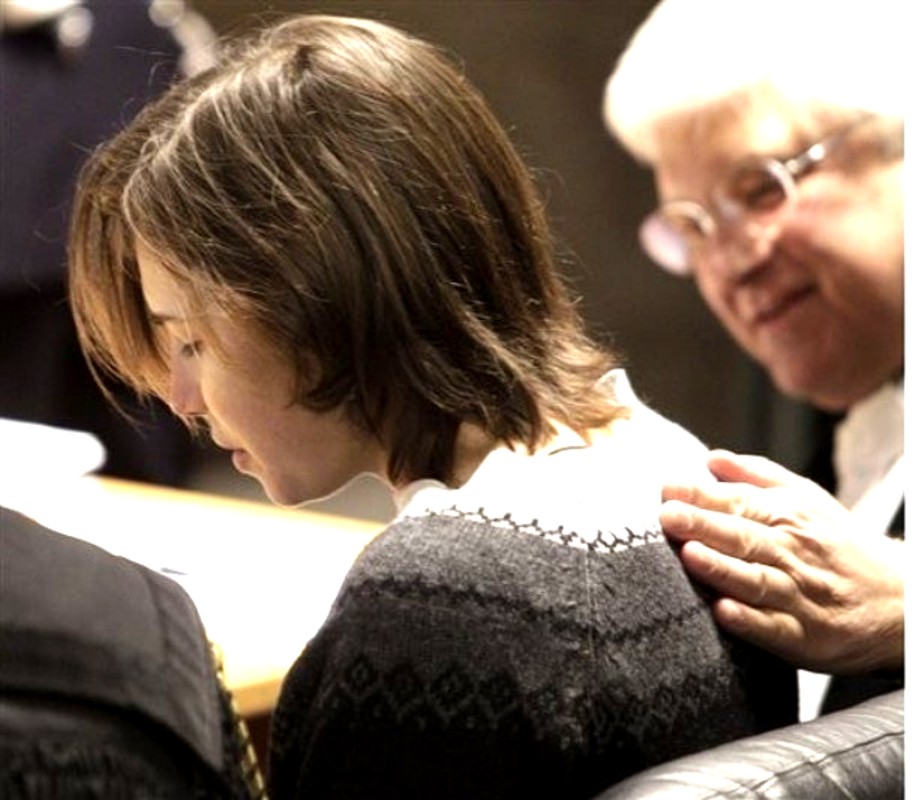
She sure has created an interesting cliffhanger.
Last Saturday Amanda Knox spoke from her seat beside her defense team and she was not subjected to cross-examination.
If she does choose to mount the stand to back up her claims with some testimony, she will be subject to cross examination, as will Raffaele Sollecito.
What may the judges and lay judges be allowed to deduce if neither of them mount the stand, or alternatively refuse to answer?
This involves the legal concepts of the Privilege against Self-Incrimination, the Right to Silence, and the Right to Lie.
In the US prosecutors are prohibited from commenting adversely on a defendant’s Exercise of the Right to Silence at trial, on the argument that doing so would violate the privilege against self-incrimination.
But this may be circumvented as demonstrated in the Duke lacrosse-team rape frame-up by the prosecutor.
The DukeLax prosecutor (echoed by many others in Durham and elsewhere) falsely alleged, publicly, a lacrosse-player “wall-of-silence” as persuasive evidence in favor of guilt, even when he knew full-well that the Laxers had transparently cooperated with prosecutorial investigators.
So much for “enshrinement” of the right to silence in the US.
There is no argument that in all three countries, Italy and the US and the UK, criminal defendants have the right to remain silent. This means that they do not have to speak in their own defence, if they choose not to do so.
However, Italy takes the privilege against self-incrimination such a giant step further that a guilty defendant, if given the choice, might be wise to choose trial in Italy, in preference to trial in either the US. or the UK.:
First, there is a significant difference between the use of the word “testify” in Anglo-American common law and its use in Italian law. Iin the former a testifying-defendant is sworn to tell the truth under oath and pain of perjury. Iin the latter, a defendant, when called to the stand, is not even “a witness”, and is not under oath:
According to the Italian Code of Criminal Procedure a defendant can be called to speak, but may refuse to “bear testimony”
Technically, a defendant does not “bear testimony”, or testify; a defendant is not even “a witness” ; in Italian, a witness is interrogato, whereas a defendant is esaminato and may refuse to answer many questions.
A defendant, in Italy, can also lie without fear of legal sanction.
Since a defendant does not take an oath and since a defendant is not technically a witness, if a defendant tells a lie, the defendant is not committing perjury.
A defendant can choose to make spontaneous statements to the Judge; and can tell whatever she/he wishes to tell and can choose not to answer any questions. In the Perugia case too, a defendant can lie without legal sanction.
So, if Amanda Knox speaks at her trial, neither the Judges, the Prosecutors, nor Defendant’s Counsel neccessarily expect her to speak the truth - they may expect her to lie her head off.
Prosecutors will not try to directly expose her lies so much as they will try to expose the contradictions in her various statements.
Amanda Knox’s prepared statement-to-the-court at her trial [as opposed to her testimony] restricted itself to the subject of the false accusations she made against Patrick Lumumba. This unsworn statement could not be submitted to cross-examination. Such unsworn statements are also possible in the other jurisdictions.
In the case of the Meredith;s murder there seems to be an ample supply of evidence showing their guilt, such as the multiple contradictions both between and within their statements.
Furthermore, even if no one, ever, comments adversely on these defendant’s exercise of the right to silence, think of Simon and Garfunkel’s famous “Sounds of Silence”
That song reminds us that finders-of-fact, at least subliminally, can hardly avoid being influenced by accused defendants’ silence.
Saturday, December 11, 2010
Kercher Family Lawyer Walks Out As Amanda Knox Engages In What Looks Like Yet Another Stunt
Posted by Peter Quennell
The other day Meredith’s father John made a strong plea for the cruel and callous PR games to stop.
John Kercher made it pretty clear that he disbelieves EVERYTHING now that Amanda Knox and her parents say in their endless media quotes and appearance. The English version of John Kercher’s letter is here and the Italian version is here.
Amanda Knox’s mother Edda Mellas was almost immediately reported as reacting to John Kercher thus:
Mellas also addressed the issue today on KIRO Radio in Seattle saying the Kerchers do not “know the whole story.” She said they were not in court except for a few days during Amanda’s trial and feels that they fell “hook, line and sinker” for what their lawyer and prosecutors told them. “They may not have the whole picture,” she said.
That callous and inaccurate reaction did Edda Mellas no good at all. Many who were still cutting her a little slack were appalled by this dishonest and smearing attack.
In fact the Kercher family have been extremely well informed and they have remained singularly cool-headed, dignified and truthful throughout. .
Unlike Edda Mellas they have actually read the Massei Sentencing Report. Unlike Edda Mellas they show no signs of having swallowed anything hook line and sinker. Unlike Edda Mellas they do not again and again lie about basic facts of the case. Unlike Edda Mellas, they did not hide the fact that an innocent man, Patrick Lumumba, was in jail because Amanda Knox lied to put him there.
And unlike Edda Mellas their view of Amanda Knox’s guilt is no different from maybe 95 per cent of the Italian population. They do get the whole picture.
Time for damage control? Today in court, Amanda Knox seemed to set out to try something completely different. A limited qualified evasive emotional non-explanation of an explanation. An “I didnt do it but I am so sorry for Meredith and her family anyway” kind of hangout.
To underline his contempt for this ploy, Mr Maresca conspicuously walked out of the court when Amanda Knox started her rambling nervous statement. If the statement actually won any new sympathy for her among the case-watchers in Italy, we are not seeing this reflected in the Italian media reports.
Here is Nick Pisa reporting objectively from Perugia in the Daily Telegraph - in his final para below, it seems he has the same interpretation of the real purpose of Amanda Knox’s statement as we do.
Knox, 23, broke down several times as she delivered an emotional 20-minute address to the court hearing her formal appeal against conviction, her voice sometimes quavering as she claimed that she had nothing to do with Miss Kercher’s brutal death.
The American dismissed the prosecution’s view of her, saying she was not the “dangerous, diabolical, jealous, uncaring and violent” person depicted during her original trial, telling the court: “That girl is not me.”
Knox also expressed her sympathy towards’s Miss Kercher’s family and friends and said through tears: “I am very sorry that Meredith is no longer here. I have little sisters as well and the thought of being without them terrorises me.
“What you are going through and what Meredith went through is unacceptable and incomprehensible. I remember Meredith and my heart breaks for you. I am honoured to have known her. I don’t know how you must feel, your suffering over a lost life.”
Knox’s words appeared to be in response to John Kercher, Meredith’s father, who recently complained that Knox had been accorded the “status of a minor celebrity” while his daughter was a forgotten victim.
Amazingly, all three of the largest US networks had Ella Mellas on their breakfast shows, unchallenged and fawning, to claim that Amanda Knox’s performance was amazing. Edda Mellas of course speaks no Italian.
Meanwhile, back in the real world, the Italian reporting highlighted Mr Maresca walking out and reported his highly critical statement verbatim. NO media website today carried a majority of pro-Knox comments.
And in making herself so obviously the center of the universe in her statement, Amanda Knox may have already cooked her own goose with the new judges.
[Below: This now is a full audio recording of the full statement of Amanda Knox with court images ]
Sunday, November 28, 2010
The Knox Team Makes A Loud Blustery Attempt To Put Lipstick On Its Pig Of A Defense DRAFT
Posted by Peter Quennell
The issues they have to confront include the dramatic changes to her stories, a complete lack of any alibi, the staged break-in, the evidence of mixed DNA (hers and the victim’s), and the proven lies about her activity on the morning after the murder. Taking the court of appeal on a magical mystery tour of a missing knife is nothing more than a distraction.
A court can only strive to establish a motive but, if it’s clear that those tried are guilty, then the motive is not the be all end all.
The most important thing about motive is assessing it in order to determine what the risk is, in future, of the offender repeating the crimes and in murder, especially, what the dangers will be to society.
“Motive” is not an element of the crime. Prosecutors prefer to have a motive because it ads to proof of guilt, but it doesn’t need to be proved. “Intent” is not the same thing “motive.” Intent is an element of first degree murder in common law jurisdictions.
So, media coverage causes unfair trials? Those who endured Stalin’s secret trials might be surprised to know about this. Would a complete media blackout have changed any of the evidence used to convict the two young adults?
It’s ironic that Curt and Edda and the FOA complain about the media influencing the judges and jury in this case when they have done their utmost to influence the legal proceedings in Perugia through the media.
Knox on stand
sure hope Knox’s lawyers aren’t hinging their entire case on the possibility of a second knife existing or not. That’s somewhat beyond belief. They have to deal with the knife that does have her DNA on the handle and Meredith’s on the blade. Mocking the judge for introducing a second knife that wasn’t found sounds like desperation.
The other thing they’re apparently focusing on is lack of motive. This too is a mistake. She’s a quirky Seattlite who conducts sing-a-longs in the courtroom at her own murder trial. And you’re going to ask the appeal court to look deeper for a motive?
I agree that attacking the conviction on the basis of a second knife and motive seems incredibly lame. The evidence you cite is a huge hurdle to get over. They don’t just need to score one or two points (they will probably do so) but address many, many inconsistencies. There are so many strands to this particular web they have woven, and some huge holes in it they have to fill in order to be ‘let off’. I would be astonished if this were to happen. The suggested grounds for appeal here make me pity the pair of them. After all this time, this is their best shot? Holy cow. Their parents must be working hard to maintain the facade of optimism…
I sure hope Knox’s lawyers aren’t hinging their entire case on the possibility of a second knife existing or not. That’s somewhat beyond belief. They have to deal with the knife that does have her DNA on the handle and Meredith’s on the blade. Mocking the judge for introducing a second knife that wasn’t found sounds like desperation.
“Problem is, no one ever mentioned that in court. In fact, the existence of a second knife, Team Knox asserts, was never entered into evidence and as such, should not have appeared in the judge’s reasoning for his conviction.”
Mignini mentioned the second knife when he put forward the prosecution’s scenario of what happened that night.
Wednesday, November 24, 2010
1st Appeal Session: Kercher Lawyer Maresca Says Verdict Perfect, Seems Optimistic This Soon Over
Posted by Peter Quennell
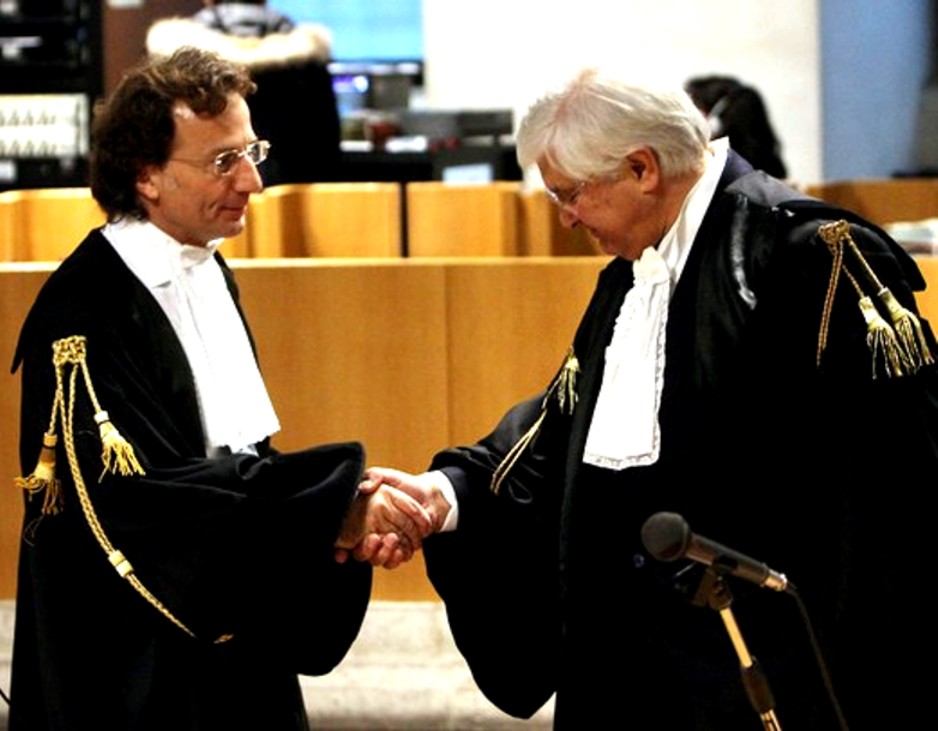
[Above: Kercher family lawyer Maresca with Knox defense lawyer Ghirga]
Dario Thuburn of the AFP reports remarks by Kercher family lawyer Francesco Maresca and Meredith’s father John.
A lawyer for Kercher’s family, Francesco Maresca, said the original sentence against Knox was “perfect” and said he would “call for justice again.”
He said the Kercher family is eager “to close this chapter.”...
Kercher’s father, John, meanwhile sent a letter to the mayor of Perugia through his lawyers to thank local authorities for setting up a scholarship in her name at the university where she was on an exchange programme.
“Meredith loved Perugia and had made a lot of friends there,” John Kercher wrote, adding that the family was “moved” by the scholarship decision.
Also included in Dario Thuburn’s report on today’s short session:
A nervous-looking Amanda Knox began her appeal on Wednesday against her conviction for the gruesome sex-murder of a British student in the medieval Italian city of Perugia in 2007….
“We feel as though we have a very good case,” her step-father, Chris Mellas, told AFP ahead of the hearing. “She’s going to go home,” said Mellas, who has been living in Perugia since September to help Knox prepare for her appeal….
Wednesday’s hearing lasted only a few minutes and the appeal court judge scheduled the next hearings for December 11, December 18 and January 15…
[Knox defense lawyer] Ghirga said the defence would focus on DNA evidence linking Knox to the crime scene that he said had been questioned by three scientific opinions. The lawyer said Knox’s mother and father would be at the hearing on December 11 and said he expected the trial to conclude in February or March.
Asked about her health, he said: “She looks terrible. She’s very thin.”.. Prosecutors have said they will seek a life sentence for Knox—their original request in her first trial—if the conviction is upheld.
Note what Mr Ghirga said about the appeal maybe being over in February or March. The judge decided on sessions only once a week (Saturdays to suit the pregnant lawyer Giulia Bongiorno) which suggests it’s all over in 10 sessions or less.
We believe the only way it can conclude as soon as that is if all or most of the requested DNA re-testing and new witnesses are refused. DNA re-testing alone could take months.
That makes the 11 December appeal session into quite a cliffhanger.
We can see no overwhelming reason yet for the verdicts to be overturned, and if there is going to be one it can only come from that retesting and any new witnesses if allowed.
1st Appeal Session: Judge Claudio Pratillo Hellmann And Prosecutor Giancarlo Costagliola
Posted by Peter Quennell
Thursday, November 18, 2010
First Appeal Hearing Next Wednesday In Suggestive Absence Of Sollecito Lead Lawyer Giulia Bongiorno
Posted by Peter Quennell
The first appeal hearing next Wednesday 24 November will be technical or procedural.
The hearing to be presided over by by Appeals Judge Claudio Pratillo Hellman will cover the lawyers’ motions on evidence and witnesses.
If at the next hearing on 11 December those requests are disallowed (all of the Guede team’s requests during Guede’s appeal last December were disallowed) this level of appeal for Knox and Sollecito might be over within two months if we assume two hearings a week. .
Appeal Prosecutor Giancarlo Costagliola will be joined by main-trial prosecutors Manuela Comodi and Giuliano Mignini. This was a judge’s decision, and not Ms Comodi’s or Mr Mignini’s, and it was to ensure that many months would not be wasted mastering the complexities of the Massei Report and the further many thousands of pages of documents that make up the case.
The defence teams will consist of Giulia Bongiorno, Luca Maori and Donatella Donati for Raffaele Sollecito, and Luciano Ghirga, Carlo Della Vedova and Maria del Grosso for Amanda Knox. Ms Bongiorno is five months pregnant, and she has said that it is for this reason that she will not appear in court next wednesday.
Is this move a sign of something more to come?
During the trial last year, the prosecution hardly missed a beat and the pace was relentless. When it came time for the defense phase, it was slow and hesitant, some court days were canceled, and some of the defense presentation seemed decidely ad hoc.
Once last year Ms Bongiorno disappeared for weeks on end, ostensibly on parliamentary business, and later in the year she developed an attack of appendicitis at a key moment. That threw into question whether she would handle the end-of-trial defense summation - at the last moment, some part of it she did
She presumably isn’t liking this case very much. Her attempt amidst much publicity to have someone actually simulate Guede’s supposed climb through Filomena’s bedroom window was a total ignominious failure. And we have heard that the Sollecito family and defense team despise the Knox entourage and PR scheme with its incessant sliming of the Italian justice system and its main players in this case, which has done them nothing but harm.
Raffele Sollecito himself has still not provided Amanda Knox with a full alibi for the night (his last word was that she was out for four hours) and on the whole seems to show signs of pulling way from her rather than of associating himself with her any closer. They talked by phone a few days ago but the call was officially monitored and so we presume nothing significant was said.
The Knox defense might complain about no videotape or recording of Knox fingering Patrick, for which she was awarded an extra year in prison. But the unscheduled WITNESS interrogation of Knox did not require a recording - witnesses by the thousand are questioned by police daily all over the world (watch any crime show on TV) without a video recording being made.
Maybe it is just as well for Knox as she seemingly cracked because Sollecito made her crack - by calling her a liar in the next room, over their first alibi, and changing his own. Better not to have recorded that…
The mitigating factors that Judge Massei accepted that are being appealed against by the prosecution include whether Knox demonstrated some remorse by placing the duvet over Meredith after the attack - meanwhile apparently removing her cell phones and locking the door some minutes before Meredith finally succumbed.
They also include whether Knox instigated the attack on Meredith. Judge Massei concluded that Guede instigated it, but Mignini had argued that there was a payback element to the attack, which may have entered their minds the previous day (those AK messages to Meredith) or that same fateful night (Patrick’s message saying no need to come to work, one interpretation being that Amanda was on the point of being fired.)
On the demand for some retesting of the DNA, it is worth recalling that the defense experts were expected to attend the one time only testing of the DNA on the knife - but on that day despite weeks of advance notice they found “good” reason to be elsewhere.
On the demand for retesting of Sollecito’s DNA on the bra clasp, it was pressed in hard and there is zero sign that any contamination had taken place - here again. the defense played a seeming trick. The Rome labs realised within hours of their first crime scene search that the bra clasp was still back in Meredith’s room, and weeks went by before the investigators and representatives of the defense could all be there to collect it.
The many contradictory albis, the various witnesses, the luminol evidence, the post-attack behaviors, the possibilities of both Raffaele Sollecito and Rudy Guede at his second appeal, which is in December, turning into wild cards?? Not a pretty sight for Amanda Knox’s defense.
Can they get pregnant too? No doubt they wish that they could.
Tuesday, November 16, 2010
Rocco Girlanda ♥ Rocco Girlanda And Amanda Knox ♥ Amanda Knox?!
Posted by Hopeful
A little dream and art interpretation….
Rocco’s dream of being in a taxi with Amanda driving to JFK airport symbolizes his attempt to “take off to great heights” with Amanda.
Joining her in the same destination, but fearing himself as JFK who literally lost his head due to his politics.
Amanda is like Jackie who survived and went on to marry the richest man in the world. Rocco is the one who is “sticking his neck out”. Political suicide or assassination fear.
The dream image of the pink I-pod that Amanda hands to Rocco is an emblem of how he had hoped for much information out of her but the I-pod plays only one thing: Beatles. So she is very limited.
The I-pod being pink is a feminine symbol of Amanda but the “I” could also be referring to Rocco, too. He thinks, “I hope to get a lot out of this Knox connection but maybe it is very limited”.
This “gift” is limited, deceptive, like the gift she gave to Italian police with more lies in it. Rocco may feel he himself is limited like rock “˜n roll, only one style of music. Rocco “˜n roll.
When two narcissists meet, the two “I’s” try to fly.
AK’s favorite aphorism, “I know I’m not alone even when I’m alone.”””Jovanotti. Well, there’s an “I-full”. Three “I’s” in that saying and Jovanotti’s name ends with an i. The ayes have it. Miss I-pod. Mister and Miss I-pod, say “I do”.
Rocco’s book includes Amanda’s colored drawings of what else, of course HERSELF, not once but twice, lest we fail to see the message. Why should anyone have expected her to draw a nature scene, a bird, flowers, anything outside herself?
The major message of the art: she shows the world her backside. Ha ha! Nothing new. Didn’t she show that in court? In this art, she gives us the back and the hand which equals a backhand.
She backhands us. She hides her face as usual. So, a slap in the face, or a backhanded compliment.
The hands are cut off yet still seem to be grasping or like they’re reaching out to squeeze something. “Cops wanna squeeze my brain” AK was overheard to say in early wiretapped conversations by police.
She colors the human figure (complete with German pigtails?) in a stained glass look. Pigtails represent a very childish hairstyle. It’s possible she wishes she could return to a time when she wore her hair that way.
Half the hair is pulled one way, half the other, a symbol her head (mind) is divided. The dots going down the back center part of the hair disturb me for some reason.
The many colors might represent many different emotions. Of course the figure is naked, the exhibitionist always.
Wasn’t she sending Rocco’s Italian-American organization childlike tracings of her hands in earlier correspondence?
Tuesday, November 09, 2010
A Perugian Media Report (Neutral As Usual) In Italian On Knox’s Calunnia Hearing
Posted by Peter Quennell
Shown here is the more modern of Perugia’s courts not far from the questura (central police station) and the railway station. It was here that Judge Micheli tried and sentenced Rudy Guede in October 2008 and sent Sollecito and Knox off for trial.
This court is said to be more suited to closed sessions and to sessions where there is a large press. Indictees and perps enter the court via a ramp down to the basement in vans with darkened windows.
These inside shots of the ground-floor corridor are all we have posted so far on the court’s interior. It was a surprise they allowed a photographed perp walk here, there was none at the previous hearing. Maybe to show AK is okay?
That might be Chris Mellas that she gives a faint grin to, to the left. Perhaps he made sure the camera was there.
Friday, November 05, 2010
Rocco Girlanda’s Very Criticised Book On Knox Is Discussed By A Panel In Rome
Posted by Clander
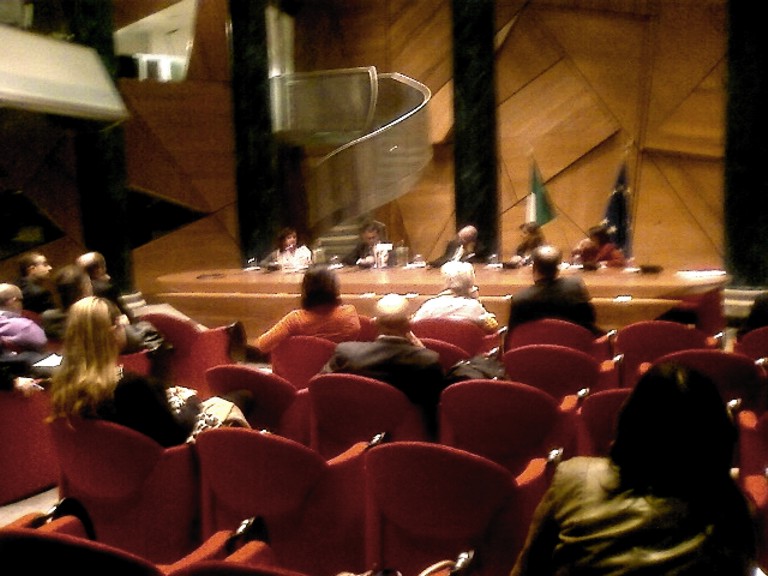
[left to right: Mangani, Girlanda, Gramaglia, Thomas, Esposito]
On Monday 14 February Yahoo News linked to this post but we suspect Yahoo actually referred to this post which is our many many question (never responded to) to the Amanda Knox apologist Italian MP Rocco Girlanda
Our previous posts on Italian MP Rocco Girlanda’s energetic involvement with Amanda Knox can be found here and here and here.
Rocco Girlanda’s Italian-American Foundation organized a panel discussion of his book “Take me with you - Talks with Amanda Knox in prison” which took place on Tuesday of last week at the Palazzo Marini
Beforehand I had lunch in a bookstore next to Palazzo Chigi. One hour later I realized I had read half of Girlanda’s book. It’s a really easy read. Too easy.
It’s all about “me, me, me and more me.” Sound familiar?.
Girlanda promotes himself (and his foundation) so much in the book that at a certain point I was not sure if the book was even about Amanda Knox. Girlanda and Knox are using each other.
Less than 40 people in total were present at the discussion. Sitting next to Rocco Girlanda were Giampiero Gramaglia (moderator, not involved in the case); Patricia Thomas (Associated Press), Pina Esposito (SkyTG24) and Cristiana Mangani (Il Messaggero)
Sabina Castelfranco (CBS) could not make it.
The Massei Sentencing Report was never once mentioned and rather extraordinarily it remained unclear throughout whether anyone on the panel had actually read it.
Meredith was first mentioned by name a full 35 minutes from the start of the debate.
I got the impression that Girlanda had read the negative comments about him that have appeared on the Internet - it almost seemed as if he was quoting from some of the comments I had read. His statements were watered-down compared to the stuff I’d heard from him in the last few days.
For example, when Gramaglia asked Girlanda if he thought that Knox was innocent, Girlanda said that he “does not know” and that “thankfully, it is not up to him to decide” reading this from his book.
We’ll see if that’s really his position on the case in the next few weeks.
Not once did he mention in the discussion that he wrote the book/is involved in the case because he thinks that he (or his foundation) has a role in US-Italy relations.
He said he recently purchased 4 laptops. Three were for his eldest children. The fourth one was for AK and he had it delivered to her a while back.
He had met yet again with Amanda Knox just two days before (that must be added to the number of visits) and he gave her a copy of his book.
The panel discussion had opened with a few sentences from Girlanda in which he explained that he started following the case after Senator Cantwell made her “anti-Americanism” claims.
Patricia Thomas stated that those remarks were “ridiculous” and that “anyone who has been to Italy or knows Italy knows they are not true”. In her words, “Italians simply love Americans” (vabbè, mo’ non esageriamo). Her spoken Italian is really good.
Girlanda stated that he is interested in the state of the prisons in Umbria and that is why he went to visit Knox in prison (in his words, his “first visit to AK was the first time I had ever entered a prison”) and that the book was written “by chance” after his numerous encounters with her.
He stressed numerous times that, as an MP, he has the right to visit prisoners.
We were told at the meeting that one American journalist has visited Knox in prison: Patricia Thomas. She was present during Girlanda’s very first visit to Knox.
Patricia Thomas described the prison. She said it is a lot better than many summer camps she had been to when she was younger. The food is amazing and she could not believe that they even have bidets in the cells. She said that she took a lot of flack for writing about this a few months ago.
Girlanda said in response that the men’s section of the prison is not as nice since it is overcrowded. He made no mention of whom he visited in the men’s section, if anyone.
Ms Thomas said she could not believe that Knox’s mom and sister were taking pictures of each other inside the Court (“as if they were tourists inside the Sistine Chapel”) only a few hours before the verdict.
She spoke very highly of the Kerchers. In particular, she spoke of Merdith’s siblings at the press conference after the trial. She described them as “beautiful, well educated and articulate”.
Gramaglia asked the 3 journalists sitting next to him how they would have voted had they been on the jury panel:
Patricia Thomas, who really did not want to answer this question, and showed no familiarity with the Massei report, said that she would have acquitted Knox and Sollecito.
Pina Esposito said that, based on the evidence, Knox and Sollecito are guilty. She would have voted guilty.
Cristiana Mangani, who showed no familiarity with the Massei report, said that Rudy Guede alone killed Meredith and that “Knox and Sollecito are in prison based on NOTHING” (yes, she said “nothing”, NIENTE). So, of course, she would have acquitted.
Ms Thomas said that Knox was “terribly handled by the PR firm and the lawyers”.
She said that in her opinion the lawyer Mr Della Vedova was hired for “opportunistic reasons” and that Mr Ghirga was “like a father who could not control his exuberant kid”.
She said that “AK’s PR efforts” should have focused on Italy and not on the US and she added that “it’s a good thing that this book has come out a few weeks before the start of AK’s appeal”.
At this point, the moderator Mr Gramaglia asks if anyone had any questions.
There was an ANSA journalist sitting in the first row who was really anxious to ask a question after Patricia Thomas made her remark about the book coming out “a few weeks before the start of the appeal”.
First of all he responded to Ms Thomas by saying that her statement that “it is good that this book has come out a few weeks before the appeal” is an insult to the Appellate Court. The ANSA journalist explained to Ms Thomas that the book would have no effect whatsoever on the Court.
He then asked Girlanda how he responds to those who are accusing him of exploiting the case and of being just another “puppy” in Knox’s hands (and by the tone of his voice and how he asked the question, it seemed as if he was one of those making the accusations).
Girlanda replied by saying that the proceeds of the book were going to his foundation and that he would not be involved when the board decides how that money should be spent.
Regarding the puppy comment, Girlanda replied “they can think what they want”.
Suddenly, no more questions were being taken.
[below Associated Press reporter Patricia Thomas who said she would have founnd AK and RS not guilty]


